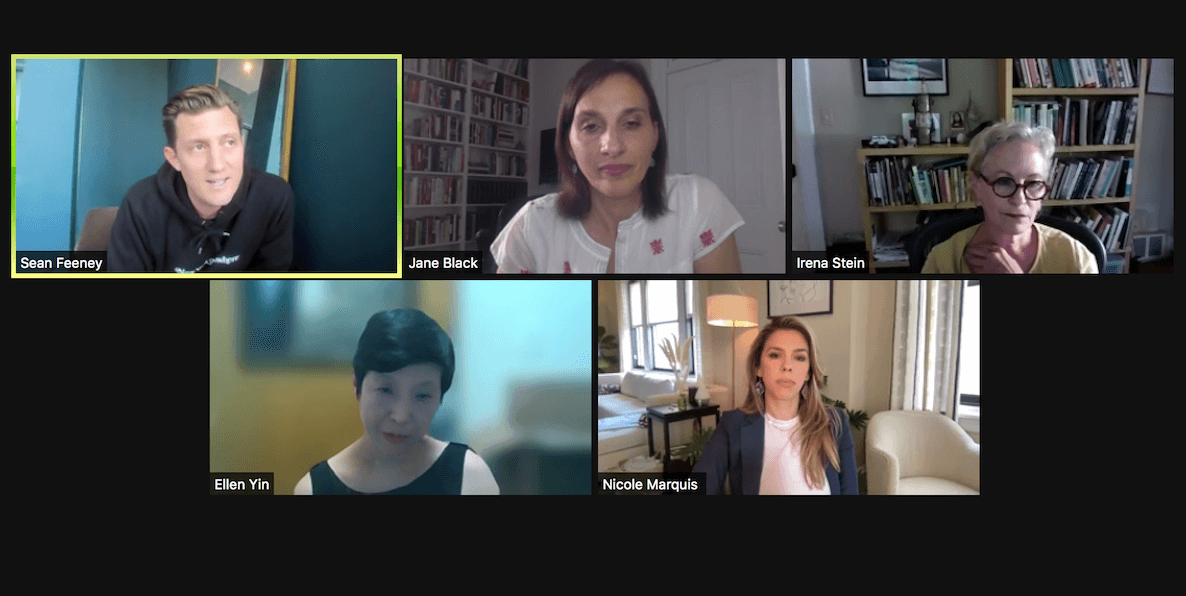The pandemic has elucidated so many things for all of us. Among them: how critical restaurants are to our daily lives, and to the fabric of our communities.
Restaurants don’t just employ and feed citizens—they nurture us, bring us together, open our worlds.
And that was especially clear on Tuesday night, as food journalist Jane Black moderated a discussion featuring Ellen Yin, owner of Fork and High Street Philly; Sean Feeney, co-owner of Brooklyn’s James Beard Award-winning Lilia and a co-founding member of the Independent Restaurant Coalition; Nicole Marquis, founder of HipCityVeg; and acclaimed chef Irena Stein of Baltimore’s Alma Cocina Latina.
Black led a riveting conversation about how the pandemic forced restaurants to switch gears—from expanding take-out options, to making menus smaller-scale, to dedicating more time, space, and staff to serving communities in need.
“One of the beautiful, unintended consequences of delivering meals to our neighbors who needed it was that when we were delivering these meals, it was giving our employees a sense of purpose. And it gave us perspective,” said Marquis. She shared how markedly different the change from in-house dining to online orders for takeout and delivery has been for her restaurants: Pre-pandemic, only 15 percent of sales came from takeout and delivery; now, that makes up 65 percent of her company’s business. “We’re an entirely different business,” she said. “We’re a tech company in some ways now.”
MORE ON LOCAL RESTAURANTS’ PIVOTS
For all of the pressure the pandemic put on restaurants—the closures it forced, the layoffs—it also hastened the pace at which the restaurant industry has made and will continue to make many other overdue changes.
“Long before anyone had heard of the coronavirus, the restaurant model was pretty shaky,” acknowledged Black. Now, industry leaders and policymakers alike are diving into tackling some of the most-needed reforms, from increasing wages, to embracing technology, to dedicating more public space to outdoor dining, to reaching marginalized citizens with healthy, culturally-relevant food.
“We have to be sensitive, culturally, to some of these communities, and make sure the food is consistent with what they want to eat, and is healthy,” said Yin.
Stein is continuing to support Baltimore’s most challenged communities, turning her restaurant over every morning to making food for those in need, and focusing on restaurant guests in the afternoon and evenings.
“It’s just [about] fighting for a healthier industry going forward,” said Feeney who, early in the pandemic, joined fellow restaurant leaders at the White House, to talk about getting the industry the support it needed. “I think the future has never been brighter or more delicious. It’s never more important or necessary to create dining experiences to make your day better,” said Feeney.
Yin closed out the night with a heartening shout-out to Philly: “This community, Philadelphia, has been an incredible support over the last year-and-a-half. I couldn’t be more fortunate to be surrounded by so many people here. It has been, actually, a really inspiring 18 months.”
If you missed the event, you can watch it below. And be sure to join us for more of The CItizen’s upcoming free events—you can see the full lineup and RSVP here.






